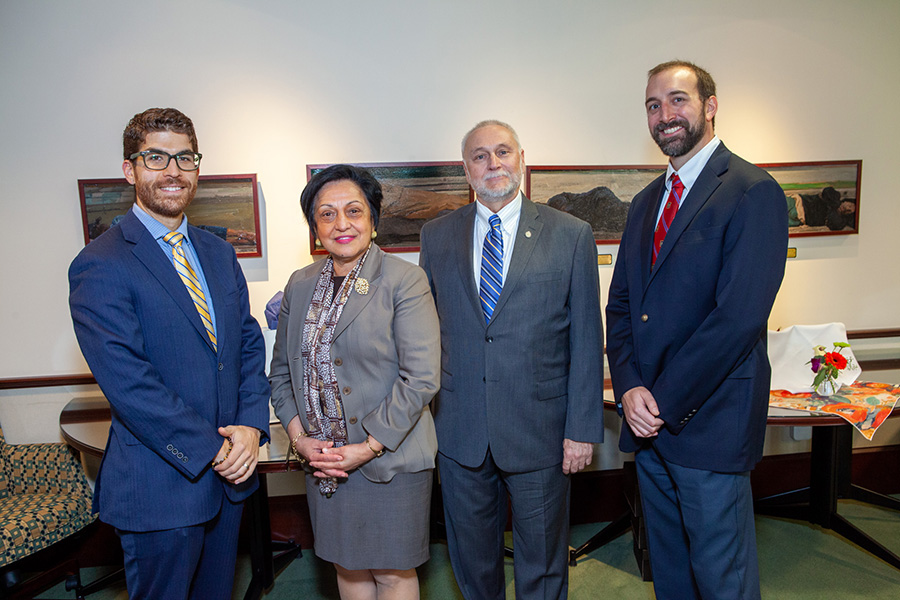


Published on October 24, 2019

Eastern Connecticut State University inducted its 12th class of distinguished alumni into the Eastern Fellows Program on Oct. 23. Cody Guarnieri ’09 is a lawyer and partner with the law firm Brown, Paindiris & Scott; Justin Piro ’05 is the principal research scientist at AbbVie’s Foundational Neuroscience Center; and Laurens “Larry” Smith ’77 is the interim vice president of statewide campuses at Utah State University.
During their visit to campus, the alumni made classroom appearances and held a panel discussion in the library, in addition to being formally inducted as Eastern Fellows during a luncheon hosted by President Elsa Núñez.
A political science and history & social science double major, Guarnieri is a trial lawyer whose practice focuses on criminal defense and personal injury litigation. He was elected to partnership with his firm just six years after graduating from the University of Connecticut School of Law in 2012.
A biochemistry major, Piro has worked in the pharmaceutical industry since earning his Ph.D. at Dartmouth Medical School, advancing scientific knowledge and developing therapies for neurological disorders and injuries, including Alzheimer’s, Parkinson’s and traumatic brain injury.
A biology major, Smith is a former researcher and college professor at Idaho State University who has spent the second half of his career as a senior university administrator. From working as a professor of physiology/anatomy, he is now responsible for oversight of eight regional campuses and 25 education centers in Utah’s state university system.
Biology Professor Patty Szczys moderated the panel, opening the discussion by asking the alumni about their career paths
When Guarnieri came to Eastern, he was sure he wanted to be a high school teacher. After job shadowing for one day, however, he decided teaching high schoolers wasn’t for him. “That was the end of my teaching career,” he joked. After a field course to Ireland, he became interested in political history, which led to an internship at the public defender’s office in New Britain and eventually to law school.
Piro credits his experiences in Eastern’s biochemistry program with setting him on the path of professional research that he’s enjoyed throughout his career. His work-study jobs in the Department of Biology led to summer research experiences at Wesleyan University, which solidified his desire to work in a laboratory.
Smith remembers fondly an ecology field course to Bermuda, led by biology professors Barry Wulff and Mike Gable. Gable’s research interests in invertebrates became his own, and a topic of study later in Smith’s research career. Admitting to having “a little too much fun” during his undergraduate years, he also expressed gratitude to the professor who steered him right and coached him through the graduate school application that landed him in the physiology program at the University of Kansas.
When asked about the soft skills developed by a liberal arts education, Piro said, “They’re the most important skills. We can develop technical knowledge, but if you can’t think critically or communicate effectively, that knowledge is useless.” He added that students’ academic experience at Eastern, a public university, is equal to that of private liberal arts colleges. “The same quality. They’re just paying a premium,” he said.
Speaking to developing relationships with faculty, Piro said, “We got to know all of the biology professors on a one-to-one basis,” adding that it was not uncommon for students to have lunch with professors. “This is one of the benefits of a school like Eastern.”
Guarnieri recalled stimulating conversations with Father Larry LaPointe, head of Eastern’s Campus Ministry, whose contemplative masses helped foster his “analytical thinking framework.” Guarnieri assured students that “there are no barriers to anyone coming from Eastern who wants to become a lawyer.” Speaking to the rigors of law school, he added, “I did not feel any disadvantage compared to my peers.”
Naturally inclined toward science, Smith admitted to “knowing a lot of dots, but not knowing how to connect them.” He says a liberal arts education was critical in making those connections, citing courses on logic that taught him the value of reasoning.
As an undergraduate, Smith remembers rolling his eyes at Eastern’s requirement to take a literature course. But these and other liberal arts courses gave him an appreciation for storytelling—a skill he says is vital for scientists, whose careers are dependent on writing grant proposals and research papers. “Scientists have to be great storytellers,” he said. “Stories give science meaning and make it come alive.”
When asked about industry challenges and advice, Piro reassured students that while “biochemistry” is a scary word, there are many career opportunities, particularly close by in the Boston area, which is a nationwide hub for the biomedical and pharmaceutical industries. Opportunities are increased and specialized, he said, when pairing different disciplines, such as biology with business administration or economics with earth science—“Giving you control of your destiny.”
Piro encouraged students to start building a network in their industry of interest, but to remember that “it’s not about the quantity of the network, but the quality of the relationships.” He also emphasized getting hands-on experience to build up resumes.
Smith acknowledged that a challenge is turning one’s passion into a paycheck, but reassured students that this takes time, different jobs and experiences, and a lot of reflection. “Your passion may change,” he told the crowd. “I was in my 40s when mine changed and I realized I wanted to work in administration. Right now, you may not know your passion, and that’s okay.”
The Eastern Fellows Program was established in the 2008-09 academic year to recognize distinguished alumni and enrich the academic experience for undergraduate students. Including the three newest honorees, 35 alumni have been inducted into the program.
Written by Michael Rouleau